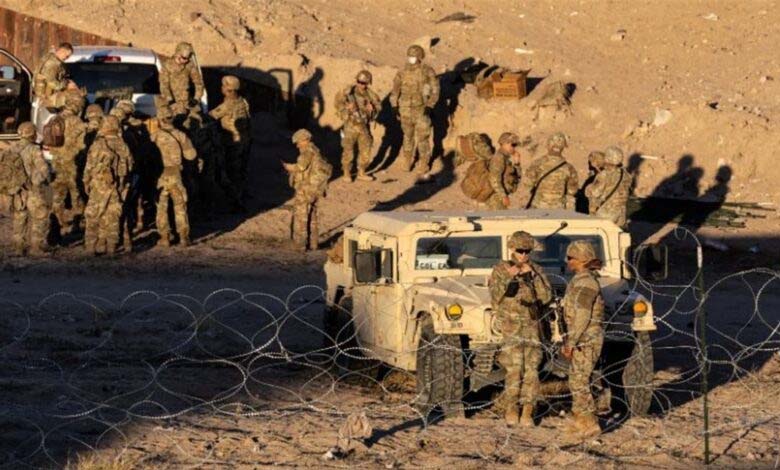Biden’s strategy to deter Iran’s proxies angers the Pentagon

With the ongoing increase in attacks by militias loyal to Tehran, Washington’s concern grows over an escalation that could lead to the loss of American lives in the region.
The escalating attacks on U.S. forces deployed in Syria and Iraq are causing frustration within the U.S. Department of Defense, the Pentagon, where officials acknowledge what they see as an incoherent strategy to confront Iran’s proxies. Limited retaliatory airstrikes approved by President Joe Biden have failed to halt the attacks.
One defense official, speaking on condition of anonymity, told The Washington Post, “There’s no clear definition of what we’re trying to deter.” He questioned, “Are we trying to deter future Iranian attacks like this? Well, it’s clear that’s not working.”
The increased anger in the Middle East over U.S. support for the Israeli war on Gaza has heightened concerns among Biden and his deputies that any overly aggressive response to attacks on American personnel could escalate tensions and lead to a broader conflict.
In conjunction with the airstrikes, U.S. administration officials have repeatedly urged Tehran over the past month to rein in the militias it supports, warning that the United States has the “right” to respond “at the time and place of our choosing.” However, those warnings have largely gone unheeded.
Since October 17th, U.S. forces in Iraq and Syria have faced near-daily attacks involving rocket launches and drones, recording at least 61 attacks and a similar number of injuries during that period. Pentagon data obtained by The Washington Post shows that the attacks targeted 10 bases used by U.S. personnel in the two countries.
In response, Biden authorized three rounds of airstrikes, all in eastern Syria. The latest, on November 12th, targeted sites identified by the Pentagon as being used by the Iranian Revolutionary Guard and “Iranian-affiliated groups.” A U.S. official said that up to seven militants were killed, a “rough estimate,” while the United States continues to assess the results.
Officials said the airstrikes destroyed warehouses containing weapons and ammunition, a command center, and a training facility. However, each operation has failed to slow the pace of hostile activity, which has resumed almost immediately in all cases.
The 61 attacks on U.S. forces also came at a remarkable pace: about 80 similar incidents occurred between January 2021 and March of this year, according to the Pentagon.
A senior defense official acknowledged that the Pentagon sees few good alternatives to the actions taken so far, including the limited retaliatory airstrikes and the reinforcement of air defense weapons. Additional options presented to the president go beyond the measures taken so far. There is also growing skepticism within the Defense Department about the current approach.
National Security Council spokesperson Adrienne Watson said in a statement that Biden has shown he “will never hesitate to take action to protect U.S. forces” and that the president is “fully prepared to take further action as needed at any moment to protect our forces.”
Washington contends that Iran provides support to militias seeking to end the U.S. presence in Iraq and Syria, where about 3,500 soldiers are stationed to prevent the return of the terrorist organization ISIS. Tehran also supports Hezbollah in Lebanon, which has threatened to open a new front against Israel, and the Houthi rebels in Yemen.
The Pentagon reported that the Houthis destroyed a $30 million U.S. Reaper drone over the Red Sea in recent days. U.S. warships also intercepted weapons launched from Yemen toward Israel in the past few weeks.
Christine Abizaid, director of the National Counterterrorism Center, told lawmakers in the House on Wednesday that despite the ongoing attacks on U.S. personnel, Iran and its proxies “are trying to walk a very fine line in the region.”
Abizaid added that there seems to be concerted efforts to avoid “overt actions that risk opening a more direct conflict with either Israel or the United States.” However, she noted that Washington is still paying the price through enabling U.S. adversaries and attacks against Israel.
Publicly, Defense Department officials have sought to downplay the significance of the attacks in Iraq and Syria, describing them as often inaccurate and causing little damage to U.S. infrastructure. They said all injured soldiers have returned to duty, categorizing reported brain injuries and other side effects as “mild.”
The United States has also added more air defense systems to the region, which have shot down several drones, according to Pentagon data.
However, with the continued rise in the number of attacks, there is growing concern that it is only a matter of time before one of them claims the life of an American service member.
Senator Kevin Cramer, a member of the Senate Armed Services Committee, said in an interview, “I don’t feel any deterrence.” “They keep firing, waiting for a response. We’re not responding, so they keep firing, and eventually, one of those drones or one of those missiles is going to kill an American, and then we’re off to the races.” He added, “I’m not suggesting we start a full-blown war with Tehran.” “But I think our posture needs to be a little more aggressive than just strict defense because, eventually, one of those drones or missiles will kill an American, and then we’re off to the races.”
A senior U.S. defense official admitted that the Pentagon sees few good alternatives to the actions taken so far, including the limited retaliatory airstrikes and the reinforcement of air defense weapons. Additional options presented to the president go beyond the measures taken so far. There is also growing skepticism within the Defense Department about the current approach.
The spokesperson for the National Security Council, Sabrina Singh, rejected hints that the ongoing attacks on U.S. forces revealed flaws in the deterrence strategy followed by the administration. She said that the lack of warfare in Gaza is evidence of the success of this approach.
Singh added that the three retaliatory operations carried out so far aim to “signal and send a strong message to Iran and its affiliated groups to stop.” When one reporter challenged this assertion, pointing out that militia fighters “continue to strike” U.S. forces, Singh said that the military response was “very deliberate” and that Iran “certainly understands this message.”
Retired General Joseph Votel, who served as the head of U.S. Central Command overseeing all military operations in the Middle East from 2016 to 2019, believes it may be too early to know whether the administration’s strategy is capable of stifling attacks on U.S. forces.
Votel, a distinguished fellow at the Middle East Institute, said, “When you do things to try to change people’s behavior, it takes some time for it to start working.” “We now have to think about scale and response, and how that has an effect over time.”












